Theories of Human Development
VerifiedAdded on 2022/12/15
|12
|3794
|354
AI Summary
This article discusses the Freudian theory of psychosexual development and Erikson's theory of psychosocial development in human development. It explores how personality develops and the key theorists involved. It also examines the behaviorist and social learning theory, as well as the humanistic and phenomenological (needs) theory.
Contribute Materials
Your contribution can guide someone’s learning journey. Share your
documents today.
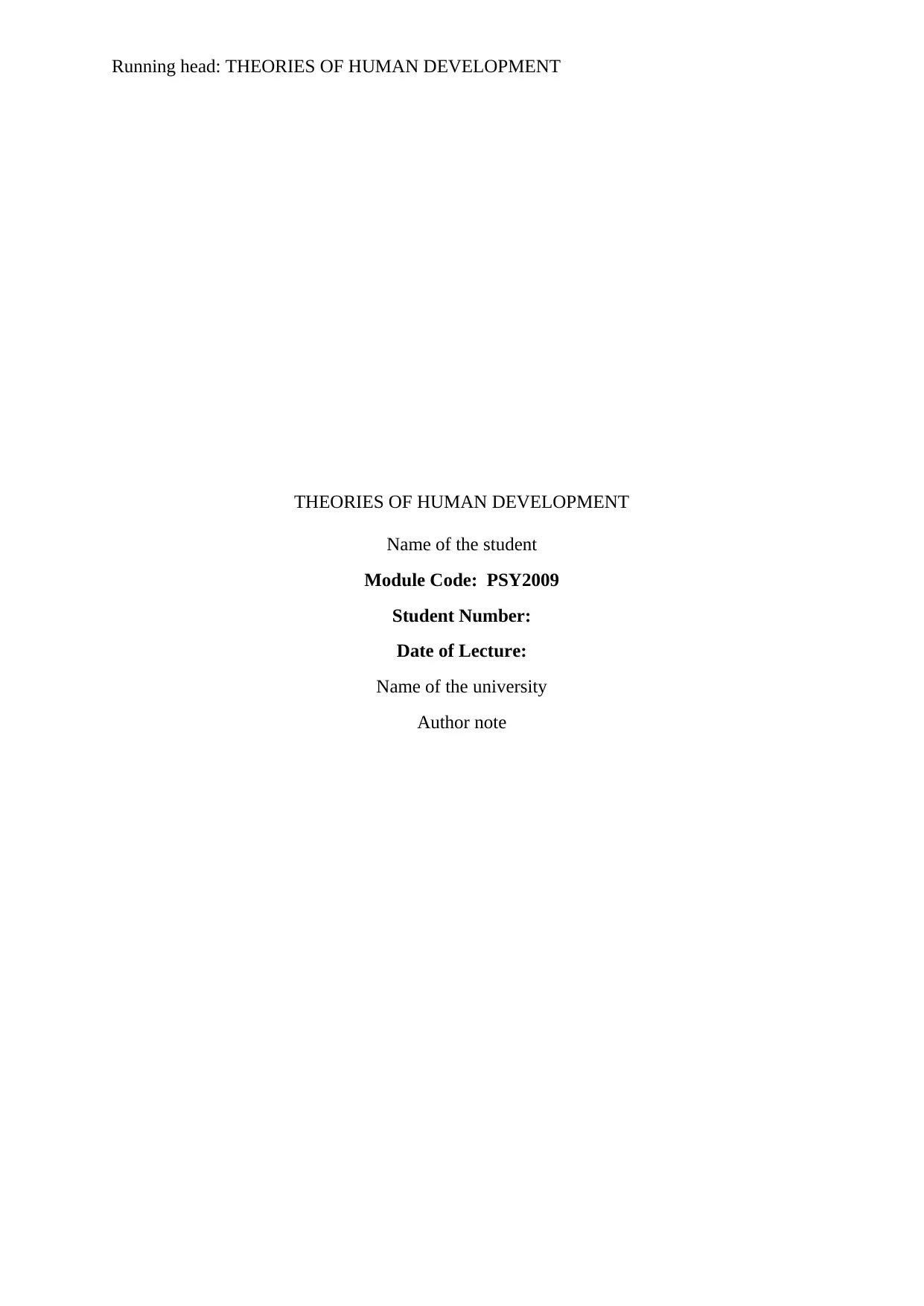
Running head: THEORIES OF HUMAN DEVELOPMENT
THEORIES OF HUMAN DEVELOPMENT
Name of the student
Module Code: PSY2009
Student Number:
Date of Lecture:
Name of the university
Author note
THEORIES OF HUMAN DEVELOPMENT
Name of the student
Module Code: PSY2009
Student Number:
Date of Lecture:
Name of the university
Author note
Secure Best Marks with AI Grader
Need help grading? Try our AI Grader for instant feedback on your assignments.
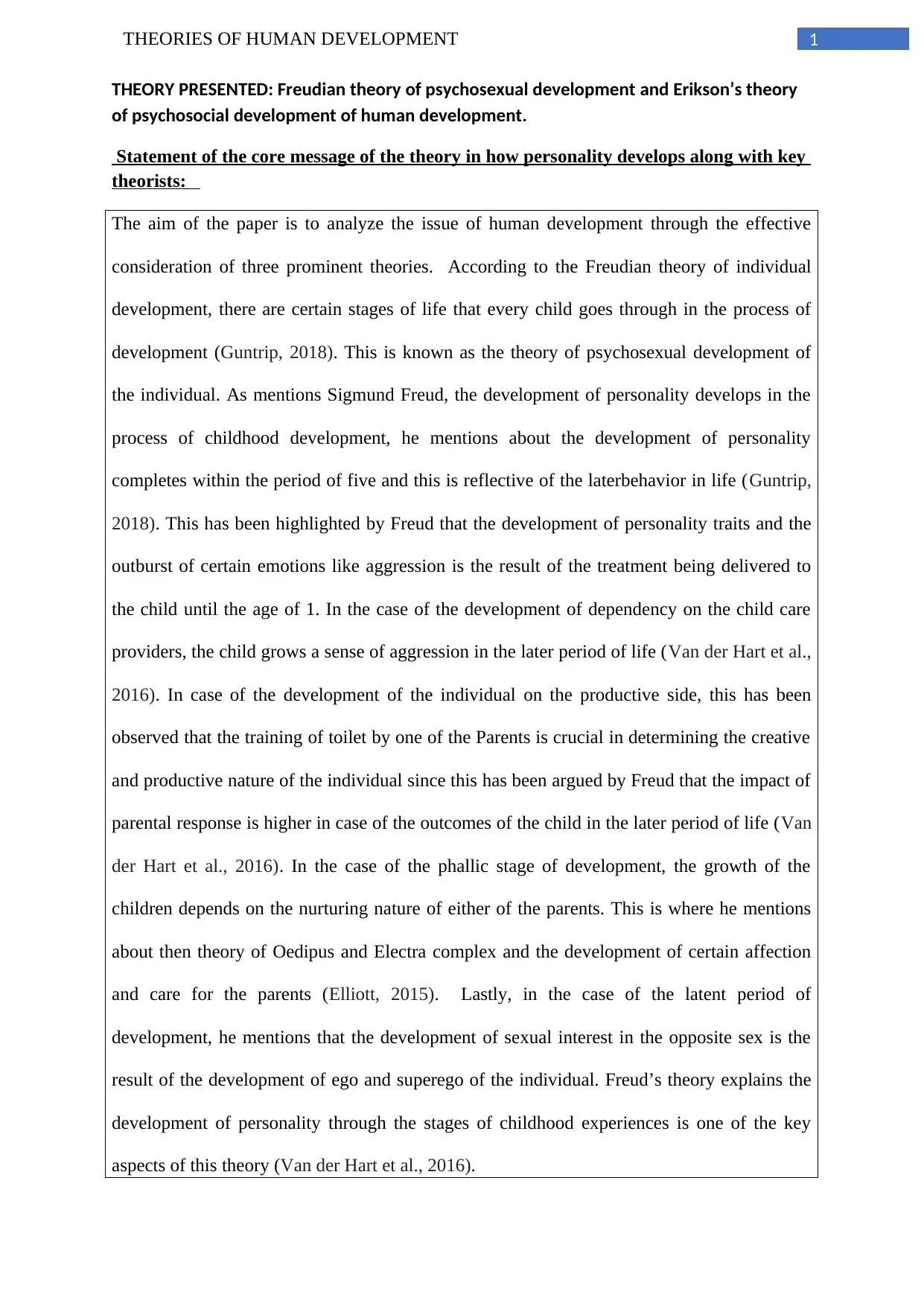
1THEORIES OF HUMAN DEVELOPMENT
THEORY PRESENTED: Freudian theory of psychosexual development and Erikson’s theory
of psychosocial development of human development.
Statement of the core message of the theory in how personality develops along with key
theorists:
The aim of the paper is to analyze the issue of human development through the effective
consideration of three prominent theories. According to the Freudian theory of individual
development, there are certain stages of life that every child goes through in the process of
development (Guntrip, 2018). This is known as the theory of psychosexual development of
the individual. As mentions Sigmund Freud, the development of personality develops in the
process of childhood development, he mentions about the development of personality
completes within the period of five and this is reflective of the laterbehavior in life (Guntrip,
2018). This has been highlighted by Freud that the development of personality traits and the
outburst of certain emotions like aggression is the result of the treatment being delivered to
the child until the age of 1. In the case of the development of dependency on the child care
providers, the child grows a sense of aggression in the later period of life (Van der Hart et al.,
2016). In case of the development of the individual on the productive side, this has been
observed that the training of toilet by one of the Parents is crucial in determining the creative
and productive nature of the individual since this has been argued by Freud that the impact of
parental response is higher in case of the outcomes of the child in the later period of life (Van
der Hart et al., 2016). In the case of the phallic stage of development, the growth of the
children depends on the nurturing nature of either of the parents. This is where he mentions
about then theory of Oedipus and Electra complex and the development of certain affection
and care for the parents (Elliott, 2015). Lastly, in the case of the latent period of
development, he mentions that the development of sexual interest in the opposite sex is the
result of the development of ego and superego of the individual. Freud’s theory explains the
development of personality through the stages of childhood experiences is one of the key
aspects of this theory (Van der Hart et al., 2016).
THEORY PRESENTED: Freudian theory of psychosexual development and Erikson’s theory
of psychosocial development of human development.
Statement of the core message of the theory in how personality develops along with key
theorists:
The aim of the paper is to analyze the issue of human development through the effective
consideration of three prominent theories. According to the Freudian theory of individual
development, there are certain stages of life that every child goes through in the process of
development (Guntrip, 2018). This is known as the theory of psychosexual development of
the individual. As mentions Sigmund Freud, the development of personality develops in the
process of childhood development, he mentions about the development of personality
completes within the period of five and this is reflective of the laterbehavior in life (Guntrip,
2018). This has been highlighted by Freud that the development of personality traits and the
outburst of certain emotions like aggression is the result of the treatment being delivered to
the child until the age of 1. In the case of the development of dependency on the child care
providers, the child grows a sense of aggression in the later period of life (Van der Hart et al.,
2016). In case of the development of the individual on the productive side, this has been
observed that the training of toilet by one of the Parents is crucial in determining the creative
and productive nature of the individual since this has been argued by Freud that the impact of
parental response is higher in case of the outcomes of the child in the later period of life (Van
der Hart et al., 2016). In the case of the phallic stage of development, the growth of the
children depends on the nurturing nature of either of the parents. This is where he mentions
about then theory of Oedipus and Electra complex and the development of certain affection
and care for the parents (Elliott, 2015). Lastly, in the case of the latent period of
development, he mentions that the development of sexual interest in the opposite sex is the
result of the development of ego and superego of the individual. Freud’s theory explains the
development of personality through the stages of childhood experiences is one of the key
aspects of this theory (Van der Hart et al., 2016).
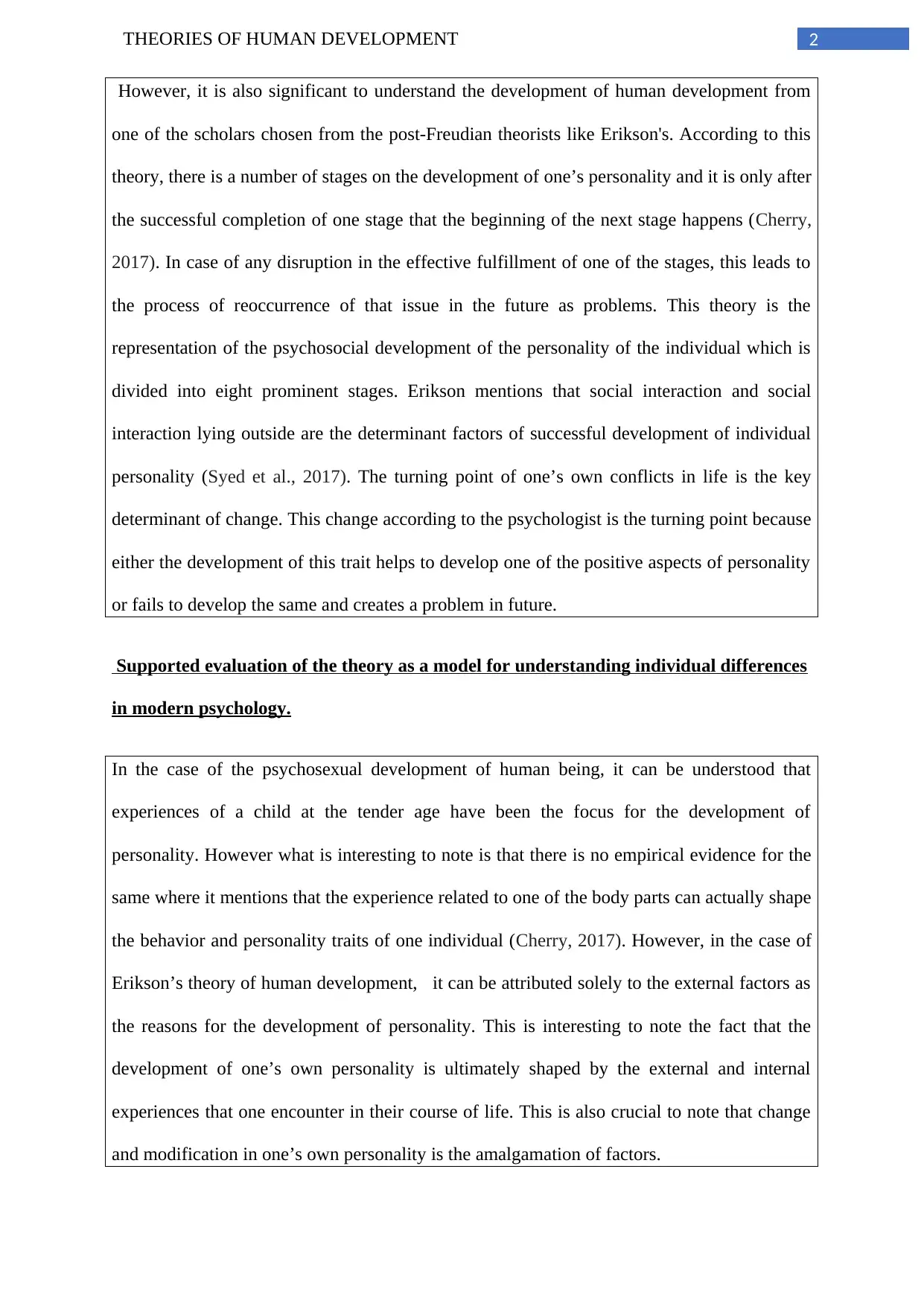
2THEORIES OF HUMAN DEVELOPMENT
However, it is also significant to understand the development of human development from
one of the scholars chosen from the post-Freudian theorists like Erikson's. According to this
theory, there is a number of stages on the development of one’s personality and it is only after
the successful completion of one stage that the beginning of the next stage happens (Cherry,
2017). In case of any disruption in the effective fulfillment of one of the stages, this leads to
the process of reoccurrence of that issue in the future as problems. This theory is the
representation of the psychosocial development of the personality of the individual which is
divided into eight prominent stages. Erikson mentions that social interaction and social
interaction lying outside are the determinant factors of successful development of individual
personality (Syed et al., 2017). The turning point of one’s own conflicts in life is the key
determinant of change. This change according to the psychologist is the turning point because
either the development of this trait helps to develop one of the positive aspects of personality
or fails to develop the same and creates a problem in future.
Supported evaluation of the theory as a model for understanding individual differences
in modern psychology.
In the case of the psychosexual development of human being, it can be understood that
experiences of a child at the tender age have been the focus for the development of
personality. However what is interesting to note is that there is no empirical evidence for the
same where it mentions that the experience related to one of the body parts can actually shape
the behavior and personality traits of one individual (Cherry, 2017). However, in the case of
Erikson’s theory of human development, it can be attributed solely to the external factors as
the reasons for the development of personality. This is interesting to note the fact that the
development of one’s own personality is ultimately shaped by the external and internal
experiences that one encounter in their course of life. This is also crucial to note that change
and modification in one’s own personality is the amalgamation of factors.
However, it is also significant to understand the development of human development from
one of the scholars chosen from the post-Freudian theorists like Erikson's. According to this
theory, there is a number of stages on the development of one’s personality and it is only after
the successful completion of one stage that the beginning of the next stage happens (Cherry,
2017). In case of any disruption in the effective fulfillment of one of the stages, this leads to
the process of reoccurrence of that issue in the future as problems. This theory is the
representation of the psychosocial development of the personality of the individual which is
divided into eight prominent stages. Erikson mentions that social interaction and social
interaction lying outside are the determinant factors of successful development of individual
personality (Syed et al., 2017). The turning point of one’s own conflicts in life is the key
determinant of change. This change according to the psychologist is the turning point because
either the development of this trait helps to develop one of the positive aspects of personality
or fails to develop the same and creates a problem in future.
Supported evaluation of the theory as a model for understanding individual differences
in modern psychology.
In the case of the psychosexual development of human being, it can be understood that
experiences of a child at the tender age have been the focus for the development of
personality. However what is interesting to note is that there is no empirical evidence for the
same where it mentions that the experience related to one of the body parts can actually shape
the behavior and personality traits of one individual (Cherry, 2017). However, in the case of
Erikson’s theory of human development, it can be attributed solely to the external factors as
the reasons for the development of personality. This is interesting to note the fact that the
development of one’s own personality is ultimately shaped by the external and internal
experiences that one encounter in their course of life. This is also crucial to note that change
and modification in one’s own personality is the amalgamation of factors.
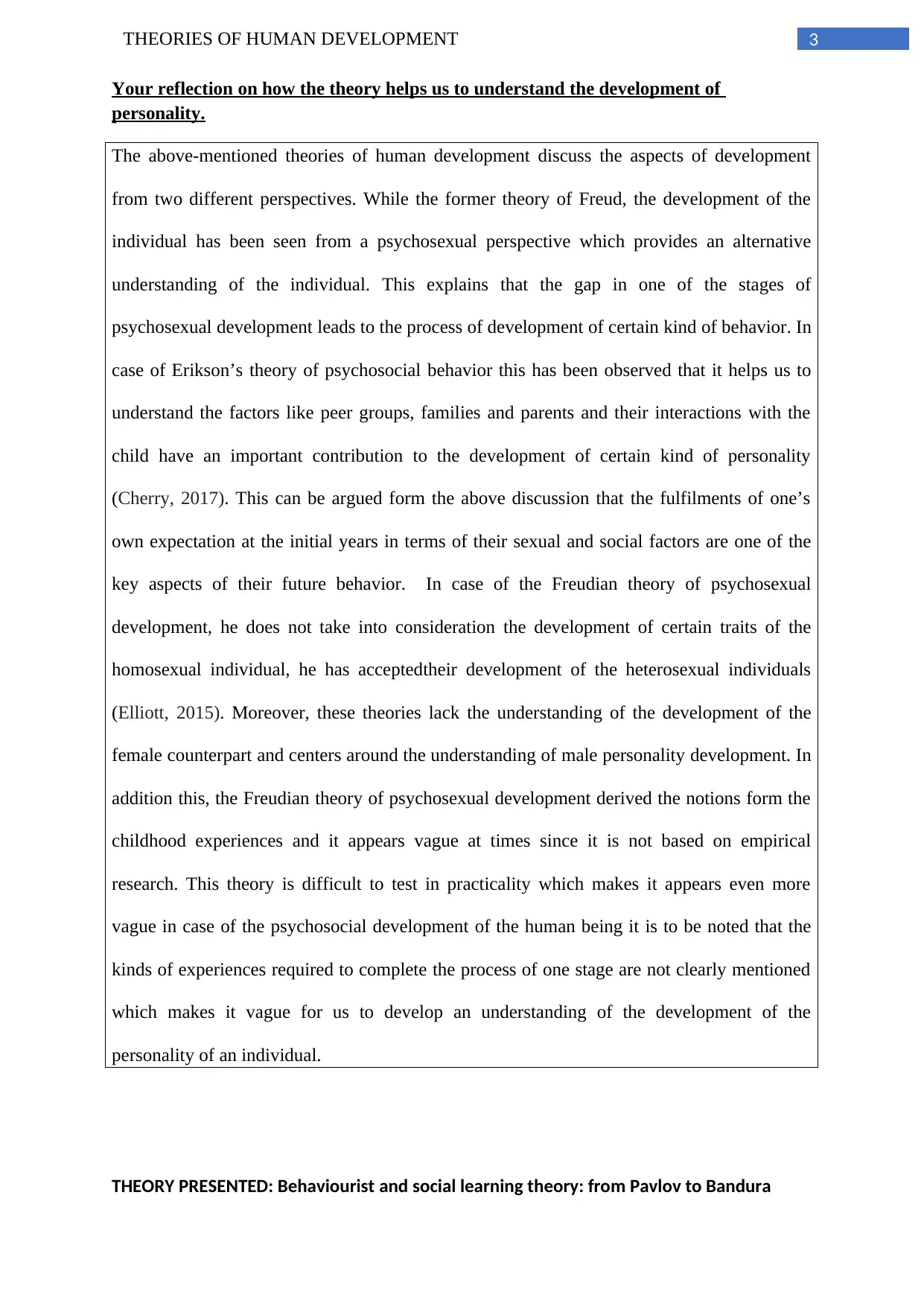
3THEORIES OF HUMAN DEVELOPMENT
Your reflection on how the theory helps us to understand the development of
personality.
The above-mentioned theories of human development discuss the aspects of development
from two different perspectives. While the former theory of Freud, the development of the
individual has been seen from a psychosexual perspective which provides an alternative
understanding of the individual. This explains that the gap in one of the stages of
psychosexual development leads to the process of development of certain kind of behavior. In
case of Erikson’s theory of psychosocial behavior this has been observed that it helps us to
understand the factors like peer groups, families and parents and their interactions with the
child have an important contribution to the development of certain kind of personality
(Cherry, 2017). This can be argued form the above discussion that the fulfilments of one’s
own expectation at the initial years in terms of their sexual and social factors are one of the
key aspects of their future behavior. In case of the Freudian theory of psychosexual
development, he does not take into consideration the development of certain traits of the
homosexual individual, he has acceptedtheir development of the heterosexual individuals
(Elliott, 2015). Moreover, these theories lack the understanding of the development of the
female counterpart and centers around the understanding of male personality development. In
addition this, the Freudian theory of psychosexual development derived the notions form the
childhood experiences and it appears vague at times since it is not based on empirical
research. This theory is difficult to test in practicality which makes it appears even more
vague in case of the psychosocial development of the human being it is to be noted that the
kinds of experiences required to complete the process of one stage are not clearly mentioned
which makes it vague for us to develop an understanding of the development of the
personality of an individual.
THEORY PRESENTED: Behaviourist and social learning theory: from Pavlov to Bandura
Your reflection on how the theory helps us to understand the development of
personality.
The above-mentioned theories of human development discuss the aspects of development
from two different perspectives. While the former theory of Freud, the development of the
individual has been seen from a psychosexual perspective which provides an alternative
understanding of the individual. This explains that the gap in one of the stages of
psychosexual development leads to the process of development of certain kind of behavior. In
case of Erikson’s theory of psychosocial behavior this has been observed that it helps us to
understand the factors like peer groups, families and parents and their interactions with the
child have an important contribution to the development of certain kind of personality
(Cherry, 2017). This can be argued form the above discussion that the fulfilments of one’s
own expectation at the initial years in terms of their sexual and social factors are one of the
key aspects of their future behavior. In case of the Freudian theory of psychosexual
development, he does not take into consideration the development of certain traits of the
homosexual individual, he has acceptedtheir development of the heterosexual individuals
(Elliott, 2015). Moreover, these theories lack the understanding of the development of the
female counterpart and centers around the understanding of male personality development. In
addition this, the Freudian theory of psychosexual development derived the notions form the
childhood experiences and it appears vague at times since it is not based on empirical
research. This theory is difficult to test in practicality which makes it appears even more
vague in case of the psychosocial development of the human being it is to be noted that the
kinds of experiences required to complete the process of one stage are not clearly mentioned
which makes it vague for us to develop an understanding of the development of the
personality of an individual.
THEORY PRESENTED: Behaviourist and social learning theory: from Pavlov to Bandura
Secure Best Marks with AI Grader
Need help grading? Try our AI Grader for instant feedback on your assignments.
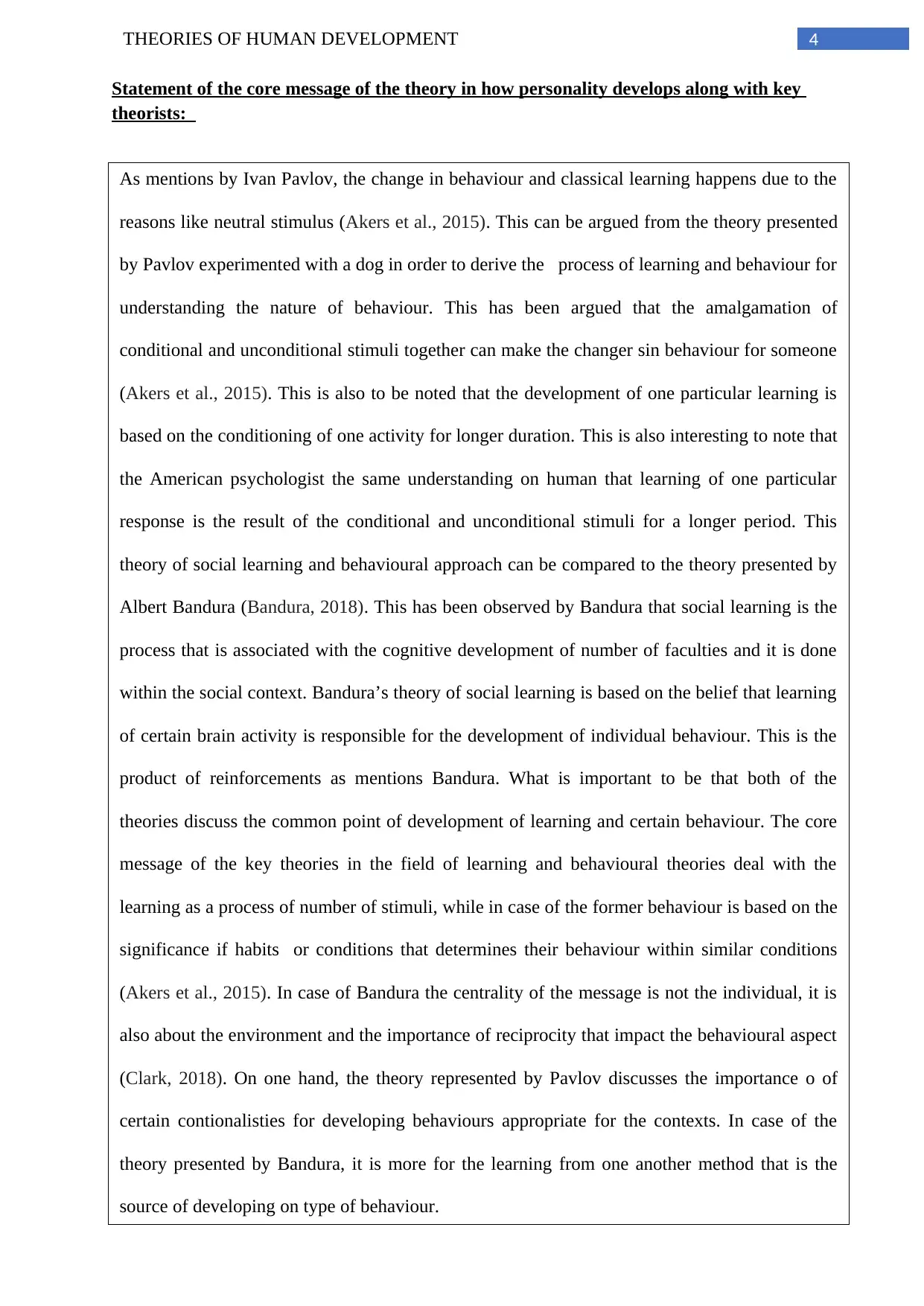
4THEORIES OF HUMAN DEVELOPMENT
Statement of the core message of the theory in how personality develops along with key
theorists:
As mentions by Ivan Pavlov, the change in behaviour and classical learning happens due to the
reasons like neutral stimulus (Akers et al., 2015). This can be argued from the theory presented
by Pavlov experimented with a dog in order to derive the process of learning and behaviour for
understanding the nature of behaviour. This has been argued that the amalgamation of
conditional and unconditional stimuli together can make the changer sin behaviour for someone
(Akers et al., 2015). This is also to be noted that the development of one particular learning is
based on the conditioning of one activity for longer duration. This is also interesting to note that
the American psychologist the same understanding on human that learning of one particular
response is the result of the conditional and unconditional stimuli for a longer period. This
theory of social learning and behavioural approach can be compared to the theory presented by
Albert Bandura (Bandura, 2018). This has been observed by Bandura that social learning is the
process that is associated with the cognitive development of number of faculties and it is done
within the social context. Bandura’s theory of social learning is based on the belief that learning
of certain brain activity is responsible for the development of individual behaviour. This is the
product of reinforcements as mentions Bandura. What is important to be that both of the
theories discuss the common point of development of learning and certain behaviour. The core
message of the key theories in the field of learning and behavioural theories deal with the
learning as a process of number of stimuli, while in case of the former behaviour is based on the
significance if habits or conditions that determines their behaviour within similar conditions
(Akers et al., 2015). In case of Bandura the centrality of the message is not the individual, it is
also about the environment and the importance of reciprocity that impact the behavioural aspect
(Clark, 2018). On one hand, the theory represented by Pavlov discusses the importance o of
certain contionalisties for developing behaviours appropriate for the contexts. In case of the
theory presented by Bandura, it is more for the learning from one another method that is the
source of developing on type of behaviour.
Statement of the core message of the theory in how personality develops along with key
theorists:
As mentions by Ivan Pavlov, the change in behaviour and classical learning happens due to the
reasons like neutral stimulus (Akers et al., 2015). This can be argued from the theory presented
by Pavlov experimented with a dog in order to derive the process of learning and behaviour for
understanding the nature of behaviour. This has been argued that the amalgamation of
conditional and unconditional stimuli together can make the changer sin behaviour for someone
(Akers et al., 2015). This is also to be noted that the development of one particular learning is
based on the conditioning of one activity for longer duration. This is also interesting to note that
the American psychologist the same understanding on human that learning of one particular
response is the result of the conditional and unconditional stimuli for a longer period. This
theory of social learning and behavioural approach can be compared to the theory presented by
Albert Bandura (Bandura, 2018). This has been observed by Bandura that social learning is the
process that is associated with the cognitive development of number of faculties and it is done
within the social context. Bandura’s theory of social learning is based on the belief that learning
of certain brain activity is responsible for the development of individual behaviour. This is the
product of reinforcements as mentions Bandura. What is important to be that both of the
theories discuss the common point of development of learning and certain behaviour. The core
message of the key theories in the field of learning and behavioural theories deal with the
learning as a process of number of stimuli, while in case of the former behaviour is based on the
significance if habits or conditions that determines their behaviour within similar conditions
(Akers et al., 2015). In case of Bandura the centrality of the message is not the individual, it is
also about the environment and the importance of reciprocity that impact the behavioural aspect
(Clark, 2018). On one hand, the theory represented by Pavlov discusses the importance o of
certain contionalisties for developing behaviours appropriate for the contexts. In case of the
theory presented by Bandura, it is more for the learning from one another method that is the
source of developing on type of behaviour.
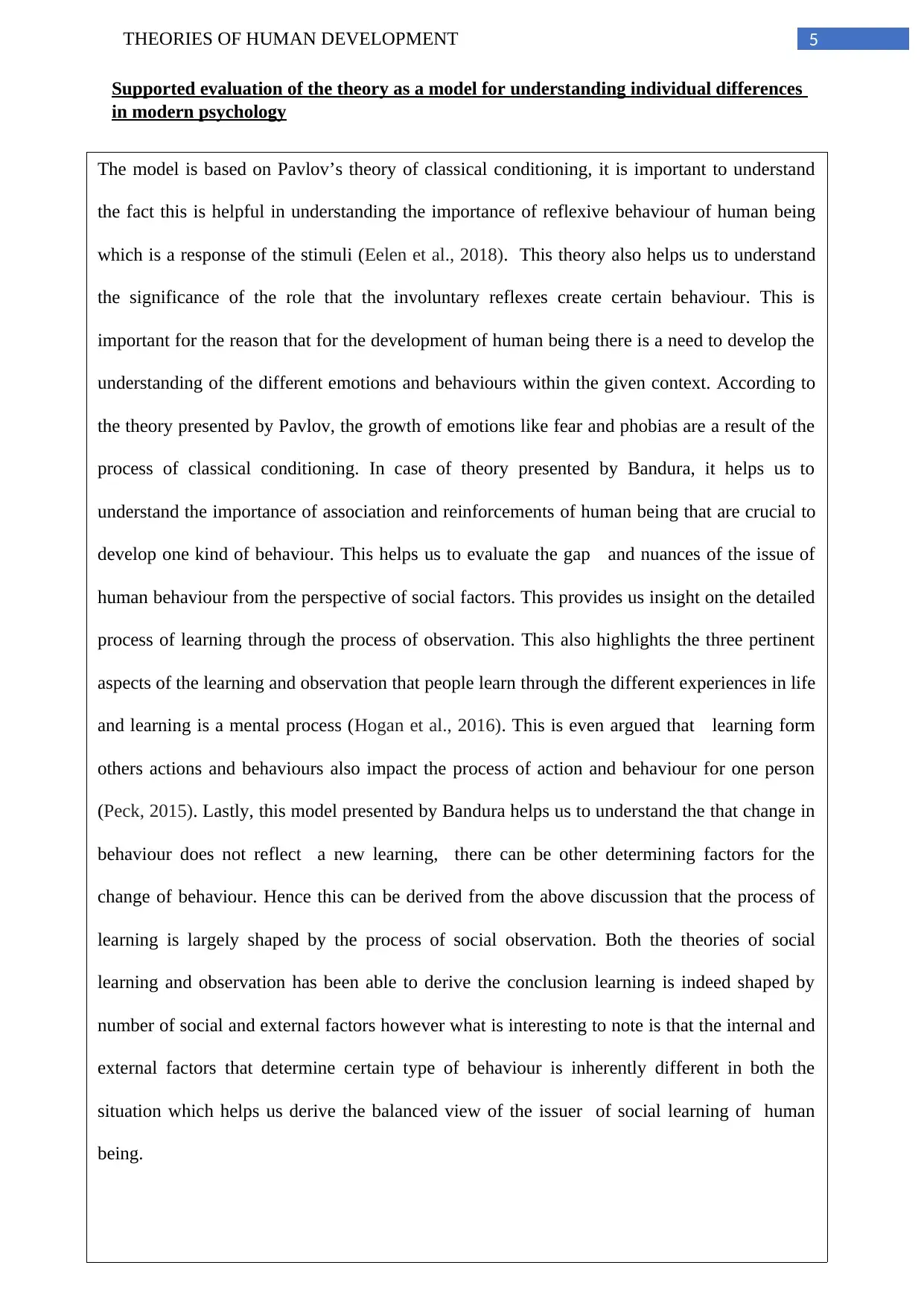
5THEORIES OF HUMAN DEVELOPMENT
Supported evaluation of the theory as a model for understanding individual differences
in modern psychology
The model is based on Pavlov’s theory of classical conditioning, it is important to understand
the fact this is helpful in understanding the importance of reflexive behaviour of human being
which is a response of the stimuli (Eelen et al., 2018). This theory also helps us to understand
the significance of the role that the involuntary reflexes create certain behaviour. This is
important for the reason that for the development of human being there is a need to develop the
understanding of the different emotions and behaviours within the given context. According to
the theory presented by Pavlov, the growth of emotions like fear and phobias are a result of the
process of classical conditioning. In case of theory presented by Bandura, it helps us to
understand the importance of association and reinforcements of human being that are crucial to
develop one kind of behaviour. This helps us to evaluate the gap and nuances of the issue of
human behaviour from the perspective of social factors. This provides us insight on the detailed
process of learning through the process of observation. This also highlights the three pertinent
aspects of the learning and observation that people learn through the different experiences in life
and learning is a mental process (Hogan et al., 2016). This is even argued that learning form
others actions and behaviours also impact the process of action and behaviour for one person
(Peck, 2015). Lastly, this model presented by Bandura helps us to understand the that change in
behaviour does not reflect a new learning, there can be other determining factors for the
change of behaviour. Hence this can be derived from the above discussion that the process of
learning is largely shaped by the process of social observation. Both the theories of social
learning and observation has been able to derive the conclusion learning is indeed shaped by
number of social and external factors however what is interesting to note is that the internal and
external factors that determine certain type of behaviour is inherently different in both the
situation which helps us derive the balanced view of the issuer of social learning of human
being.
Supported evaluation of the theory as a model for understanding individual differences
in modern psychology
The model is based on Pavlov’s theory of classical conditioning, it is important to understand
the fact this is helpful in understanding the importance of reflexive behaviour of human being
which is a response of the stimuli (Eelen et al., 2018). This theory also helps us to understand
the significance of the role that the involuntary reflexes create certain behaviour. This is
important for the reason that for the development of human being there is a need to develop the
understanding of the different emotions and behaviours within the given context. According to
the theory presented by Pavlov, the growth of emotions like fear and phobias are a result of the
process of classical conditioning. In case of theory presented by Bandura, it helps us to
understand the importance of association and reinforcements of human being that are crucial to
develop one kind of behaviour. This helps us to evaluate the gap and nuances of the issue of
human behaviour from the perspective of social factors. This provides us insight on the detailed
process of learning through the process of observation. This also highlights the three pertinent
aspects of the learning and observation that people learn through the different experiences in life
and learning is a mental process (Hogan et al., 2016). This is even argued that learning form
others actions and behaviours also impact the process of action and behaviour for one person
(Peck, 2015). Lastly, this model presented by Bandura helps us to understand the that change in
behaviour does not reflect a new learning, there can be other determining factors for the
change of behaviour. Hence this can be derived from the above discussion that the process of
learning is largely shaped by the process of social observation. Both the theories of social
learning and observation has been able to derive the conclusion learning is indeed shaped by
number of social and external factors however what is interesting to note is that the internal and
external factors that determine certain type of behaviour is inherently different in both the
situation which helps us derive the balanced view of the issuer of social learning of human
being.
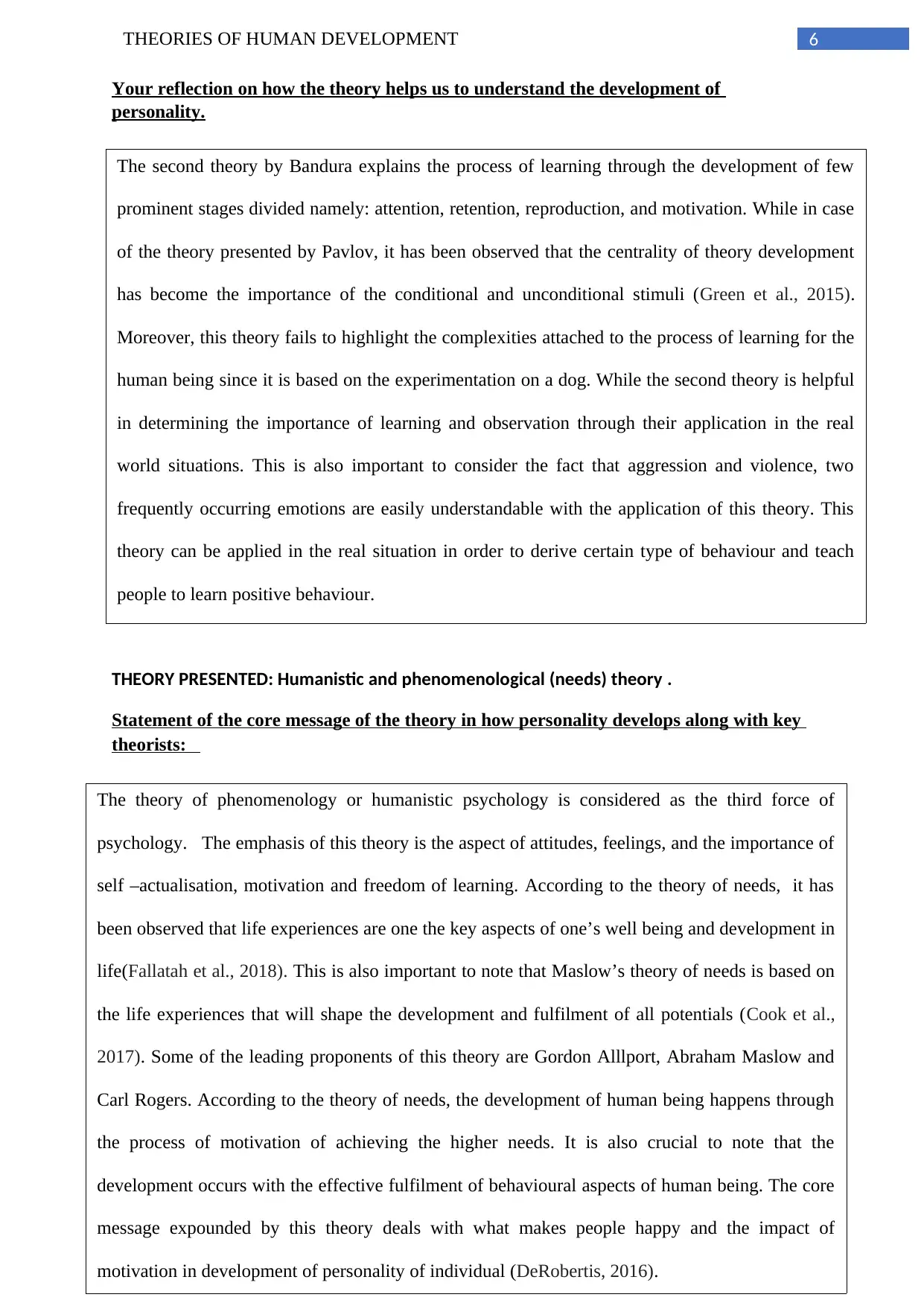
6THEORIES OF HUMAN DEVELOPMENT
Your reflection on how the theory helps us to understand the development of
personality.
THEORY PRESENTED: Humanistic and phenomenological (needs) theory .
Statement of the core message of the theory in how personality develops along with key
theorists:
The second theory by Bandura explains the process of learning through the development of few
prominent stages divided namely: attention, retention, reproduction, and motivation. While in case
of the theory presented by Pavlov, it has been observed that the centrality of theory development
has become the importance of the conditional and unconditional stimuli (Green et al., 2015).
Moreover, this theory fails to highlight the complexities attached to the process of learning for the
human being since it is based on the experimentation on a dog. While the second theory is helpful
in determining the importance of learning and observation through their application in the real
world situations. This is also important to consider the fact that aggression and violence, two
frequently occurring emotions are easily understandable with the application of this theory. This
theory can be applied in the real situation in order to derive certain type of behaviour and teach
people to learn positive behaviour.
The theory of phenomenology or humanistic psychology is considered as the third force of
psychology. The emphasis of this theory is the aspect of attitudes, feelings, and the importance of
self –actualisation, motivation and freedom of learning. According to the theory of needs, it has
been observed that life experiences are one the key aspects of one’s well being and development in
life(Fallatah et al., 2018). This is also important to note that Maslow’s theory of needs is based on
the life experiences that will shape the development and fulfilment of all potentials (Cook et al.,
2017). Some of the leading proponents of this theory are Gordon Alllport, Abraham Maslow and
Carl Rogers. According to the theory of needs, the development of human being happens through
the process of motivation of achieving the higher needs. It is also crucial to note that the
development occurs with the effective fulfilment of behavioural aspects of human being. The core
message expounded by this theory deals with what makes people happy and the impact of
motivation in development of personality of individual (DeRobertis, 2016).
Your reflection on how the theory helps us to understand the development of
personality.
THEORY PRESENTED: Humanistic and phenomenological (needs) theory .
Statement of the core message of the theory in how personality develops along with key
theorists:
The second theory by Bandura explains the process of learning through the development of few
prominent stages divided namely: attention, retention, reproduction, and motivation. While in case
of the theory presented by Pavlov, it has been observed that the centrality of theory development
has become the importance of the conditional and unconditional stimuli (Green et al., 2015).
Moreover, this theory fails to highlight the complexities attached to the process of learning for the
human being since it is based on the experimentation on a dog. While the second theory is helpful
in determining the importance of learning and observation through their application in the real
world situations. This is also important to consider the fact that aggression and violence, two
frequently occurring emotions are easily understandable with the application of this theory. This
theory can be applied in the real situation in order to derive certain type of behaviour and teach
people to learn positive behaviour.
The theory of phenomenology or humanistic psychology is considered as the third force of
psychology. The emphasis of this theory is the aspect of attitudes, feelings, and the importance of
self –actualisation, motivation and freedom of learning. According to the theory of needs, it has
been observed that life experiences are one the key aspects of one’s well being and development in
life(Fallatah et al., 2018). This is also important to note that Maslow’s theory of needs is based on
the life experiences that will shape the development and fulfilment of all potentials (Cook et al.,
2017). Some of the leading proponents of this theory are Gordon Alllport, Abraham Maslow and
Carl Rogers. According to the theory of needs, the development of human being happens through
the process of motivation of achieving the higher needs. It is also crucial to note that the
development occurs with the effective fulfilment of behavioural aspects of human being. The core
message expounded by this theory deals with what makes people happy and the impact of
motivation in development of personality of individual (DeRobertis, 2016).
Paraphrase This Document
Need a fresh take? Get an instant paraphrase of this document with our AI Paraphraser
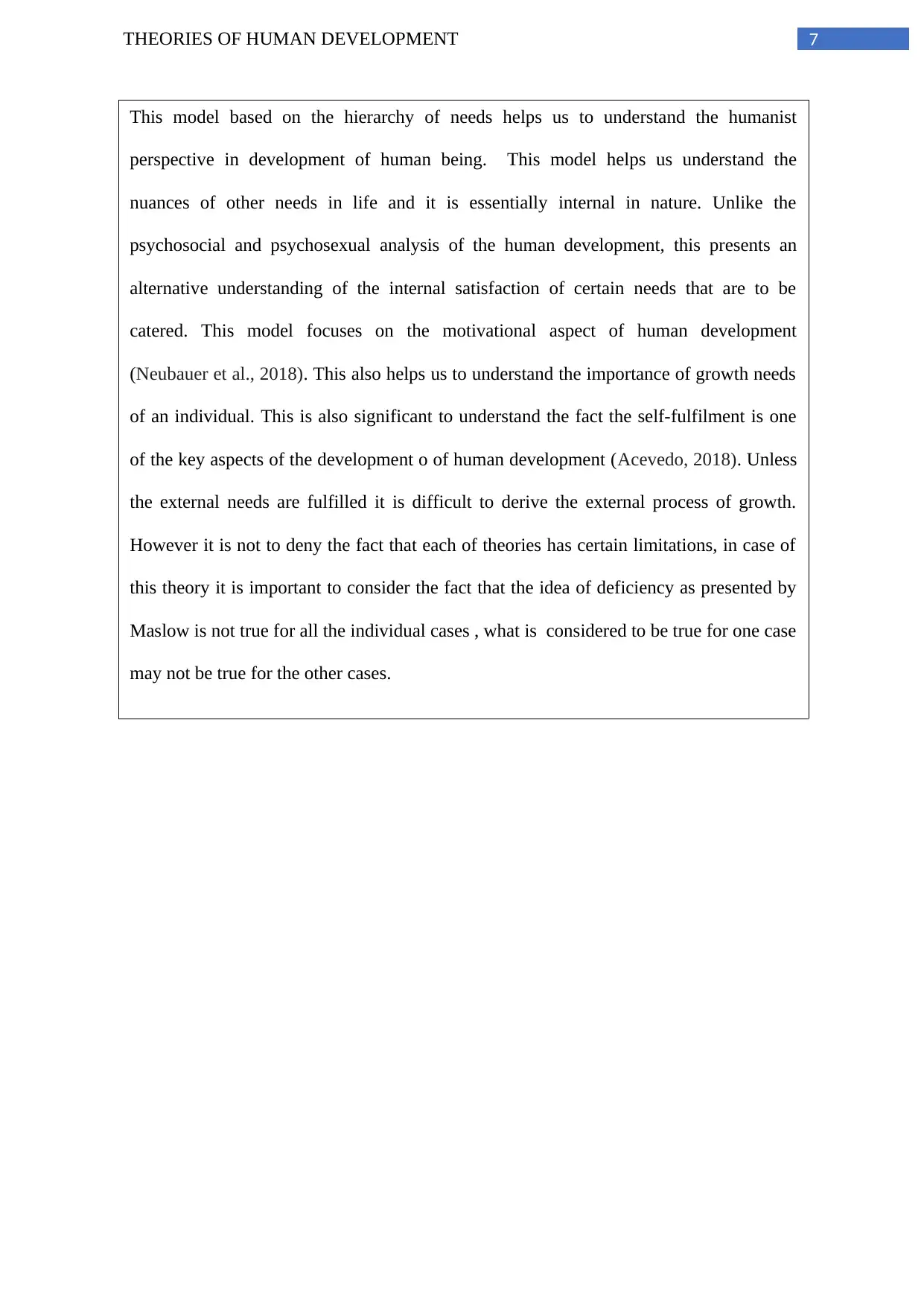
7THEORIES OF HUMAN DEVELOPMENT
This model based on the hierarchy of needs helps us to understand the humanist
perspective in development of human being. This model helps us understand the
nuances of other needs in life and it is essentially internal in nature. Unlike the
psychosocial and psychosexual analysis of the human development, this presents an
alternative understanding of the internal satisfaction of certain needs that are to be
catered. This model focuses on the motivational aspect of human development
(Neubauer et al., 2018). This also helps us to understand the importance of growth needs
of an individual. This is also significant to understand the fact the self-fulfilment is one
of the key aspects of the development o of human development (Acevedo, 2018). Unless
the external needs are fulfilled it is difficult to derive the external process of growth.
However it is not to deny the fact that each of theories has certain limitations, in case of
this theory it is important to consider the fact that the idea of deficiency as presented by
Maslow is not true for all the individual cases , what is considered to be true for one case
may not be true for the other cases.
This model based on the hierarchy of needs helps us to understand the humanist
perspective in development of human being. This model helps us understand the
nuances of other needs in life and it is essentially internal in nature. Unlike the
psychosocial and psychosexual analysis of the human development, this presents an
alternative understanding of the internal satisfaction of certain needs that are to be
catered. This model focuses on the motivational aspect of human development
(Neubauer et al., 2018). This also helps us to understand the importance of growth needs
of an individual. This is also significant to understand the fact the self-fulfilment is one
of the key aspects of the development o of human development (Acevedo, 2018). Unless
the external needs are fulfilled it is difficult to derive the external process of growth.
However it is not to deny the fact that each of theories has certain limitations, in case of
this theory it is important to consider the fact that the idea of deficiency as presented by
Maslow is not true for all the individual cases , what is considered to be true for one case
may not be true for the other cases.
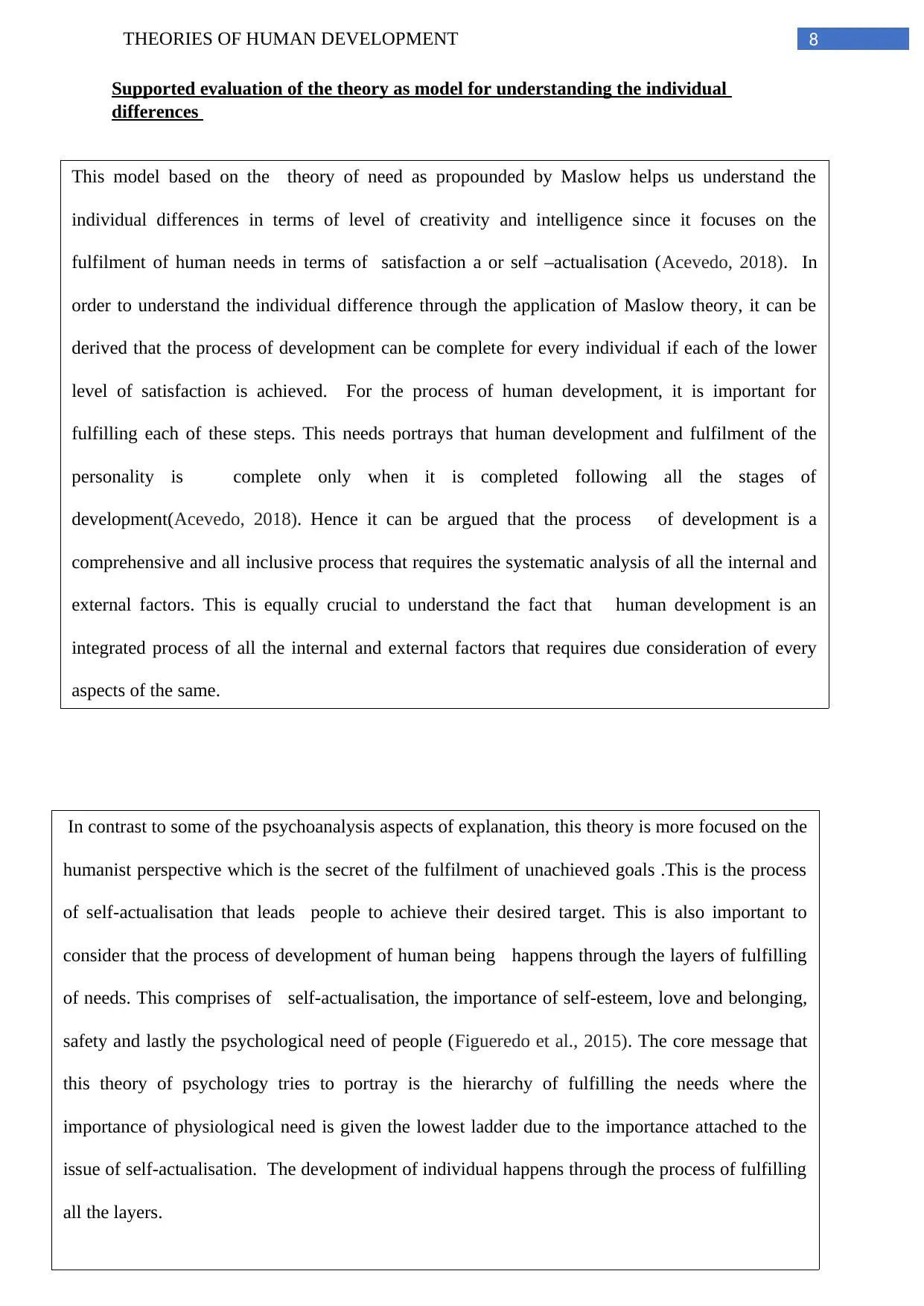
8THEORIES OF HUMAN DEVELOPMENT
Supported evaluation of the theory as model for understanding the individual
differences
In contrast to some of the psychoanalysis aspects of explanation, this theory is more focused on the
humanist perspective which is the secret of the fulfilment of unachieved goals .This is the process
of self-actualisation that leads people to achieve their desired target. This is also important to
consider that the process of development of human being happens through the layers of fulfilling
of needs. This comprises of self-actualisation, the importance of self-esteem, love and belonging,
safety and lastly the psychological need of people (Figueredo et al., 2015). The core message that
this theory of psychology tries to portray is the hierarchy of fulfilling the needs where the
importance of physiological need is given the lowest ladder due to the importance attached to the
issue of self-actualisation. The development of individual happens through the process of fulfilling
all the layers.
This model based on the theory of need as propounded by Maslow helps us understand the
individual differences in terms of level of creativity and intelligence since it focuses on the
fulfilment of human needs in terms of satisfaction a or self –actualisation (Acevedo, 2018). In
order to understand the individual difference through the application of Maslow theory, it can be
derived that the process of development can be complete for every individual if each of the lower
level of satisfaction is achieved. For the process of human development, it is important for
fulfilling each of these steps. This needs portrays that human development and fulfilment of the
personality is complete only when it is completed following all the stages of
development(Acevedo, 2018). Hence it can be argued that the process of development is a
comprehensive and all inclusive process that requires the systematic analysis of all the internal and
external factors. This is equally crucial to understand the fact that human development is an
integrated process of all the internal and external factors that requires due consideration of every
aspects of the same.
Supported evaluation of the theory as model for understanding the individual
differences
In contrast to some of the psychoanalysis aspects of explanation, this theory is more focused on the
humanist perspective which is the secret of the fulfilment of unachieved goals .This is the process
of self-actualisation that leads people to achieve their desired target. This is also important to
consider that the process of development of human being happens through the layers of fulfilling
of needs. This comprises of self-actualisation, the importance of self-esteem, love and belonging,
safety and lastly the psychological need of people (Figueredo et al., 2015). The core message that
this theory of psychology tries to portray is the hierarchy of fulfilling the needs where the
importance of physiological need is given the lowest ladder due to the importance attached to the
issue of self-actualisation. The development of individual happens through the process of fulfilling
all the layers.
This model based on the theory of need as propounded by Maslow helps us understand the
individual differences in terms of level of creativity and intelligence since it focuses on the
fulfilment of human needs in terms of satisfaction a or self –actualisation (Acevedo, 2018). In
order to understand the individual difference through the application of Maslow theory, it can be
derived that the process of development can be complete for every individual if each of the lower
level of satisfaction is achieved. For the process of human development, it is important for
fulfilling each of these steps. This needs portrays that human development and fulfilment of the
personality is complete only when it is completed following all the stages of
development(Acevedo, 2018). Hence it can be argued that the process of development is a
comprehensive and all inclusive process that requires the systematic analysis of all the internal and
external factors. This is equally crucial to understand the fact that human development is an
integrated process of all the internal and external factors that requires due consideration of every
aspects of the same.
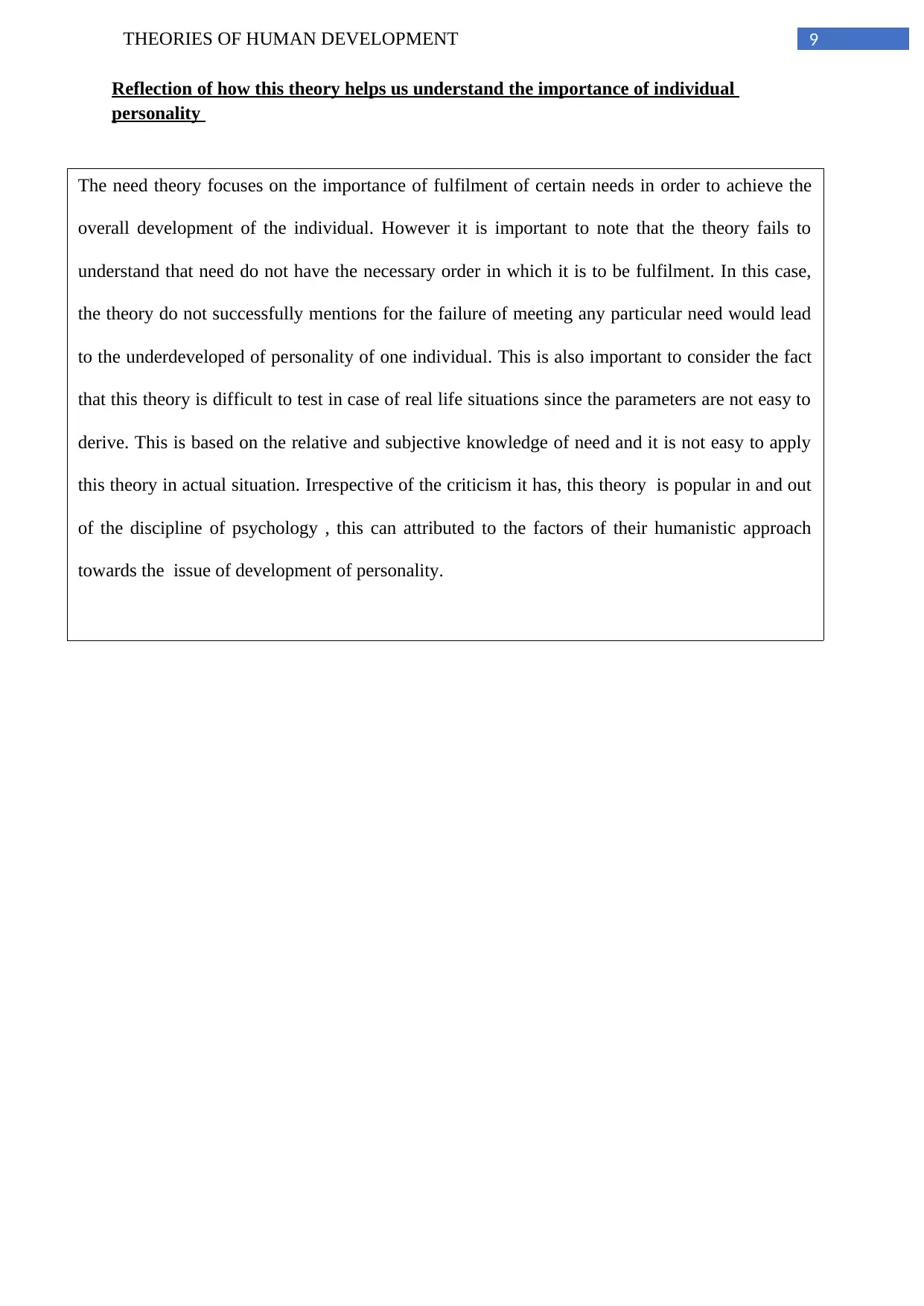
9THEORIES OF HUMAN DEVELOPMENT
Reflection of how this theory helps us understand the importance of individual
personality
The need theory focuses on the importance of fulfilment of certain needs in order to achieve the
overall development of the individual. However it is important to note that the theory fails to
understand that need do not have the necessary order in which it is to be fulfilment. In this case,
the theory do not successfully mentions for the failure of meeting any particular need would lead
to the underdeveloped of personality of one individual. This is also important to consider the fact
that this theory is difficult to test in case of real life situations since the parameters are not easy to
derive. This is based on the relative and subjective knowledge of need and it is not easy to apply
this theory in actual situation. Irrespective of the criticism it has, this theory is popular in and out
of the discipline of psychology , this can attributed to the factors of their humanistic approach
towards the issue of development of personality.
Reflection of how this theory helps us understand the importance of individual
personality
The need theory focuses on the importance of fulfilment of certain needs in order to achieve the
overall development of the individual. However it is important to note that the theory fails to
understand that need do not have the necessary order in which it is to be fulfilment. In this case,
the theory do not successfully mentions for the failure of meeting any particular need would lead
to the underdeveloped of personality of one individual. This is also important to consider the fact
that this theory is difficult to test in case of real life situations since the parameters are not easy to
derive. This is based on the relative and subjective knowledge of need and it is not easy to apply
this theory in actual situation. Irrespective of the criticism it has, this theory is popular in and out
of the discipline of psychology , this can attributed to the factors of their humanistic approach
towards the issue of development of personality.
Secure Best Marks with AI Grader
Need help grading? Try our AI Grader for instant feedback on your assignments.
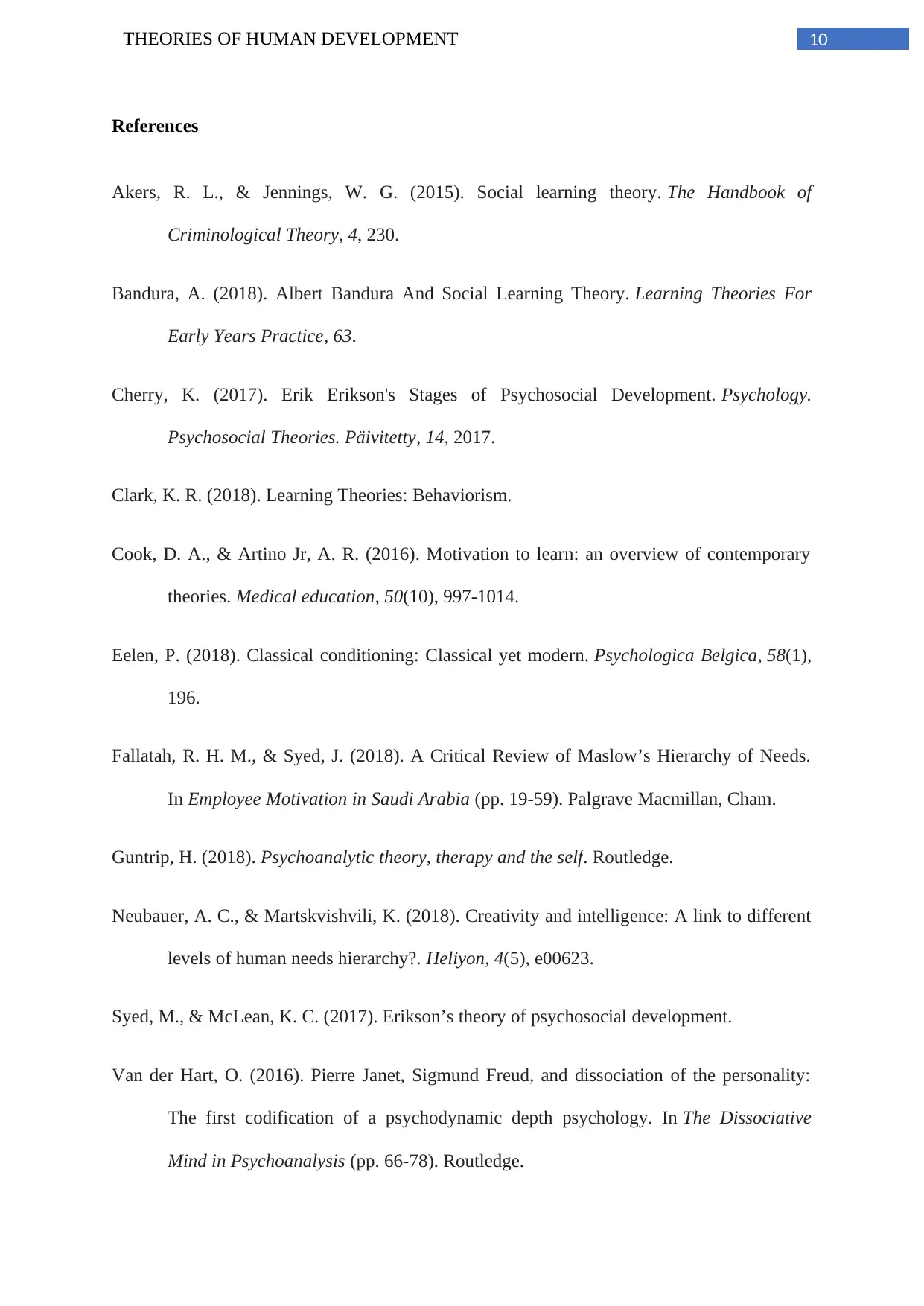
10THEORIES OF HUMAN DEVELOPMENT
References
Akers, R. L., & Jennings, W. G. (2015). Social learning theory. The Handbook of
Criminological Theory, 4, 230.
Bandura, A. (2018). Albert Bandura And Social Learning Theory. Learning Theories For
Early Years Practice, 63.
Cherry, K. (2017). Erik Erikson's Stages of Psychosocial Development. Psychology.
Psychosocial Theories. Päivitetty, 14, 2017.
Clark, K. R. (2018). Learning Theories: Behaviorism.
Cook, D. A., & Artino Jr, A. R. (2016). Motivation to learn: an overview of contemporary
theories. Medical education, 50(10), 997-1014.
Eelen, P. (2018). Classical conditioning: Classical yet modern. Psychologica Belgica, 58(1),
196.
Fallatah, R. H. M., & Syed, J. (2018). A Critical Review of Maslow’s Hierarchy of Needs.
In Employee Motivation in Saudi Arabia (pp. 19-59). Palgrave Macmillan, Cham.
Guntrip, H. (2018). Psychoanalytic theory, therapy and the self. Routledge.
Neubauer, A. C., & Martskvishvili, K. (2018). Creativity and intelligence: A link to different
levels of human needs hierarchy?. Heliyon, 4(5), e00623.
Syed, M., & McLean, K. C. (2017). Erikson’s theory of psychosocial development.
Van der Hart, O. (2016). Pierre Janet, Sigmund Freud, and dissociation of the personality:
The first codification of a psychodynamic depth psychology. In The Dissociative
Mind in Psychoanalysis (pp. 66-78). Routledge.
References
Akers, R. L., & Jennings, W. G. (2015). Social learning theory. The Handbook of
Criminological Theory, 4, 230.
Bandura, A. (2018). Albert Bandura And Social Learning Theory. Learning Theories For
Early Years Practice, 63.
Cherry, K. (2017). Erik Erikson's Stages of Psychosocial Development. Psychology.
Psychosocial Theories. Päivitetty, 14, 2017.
Clark, K. R. (2018). Learning Theories: Behaviorism.
Cook, D. A., & Artino Jr, A. R. (2016). Motivation to learn: an overview of contemporary
theories. Medical education, 50(10), 997-1014.
Eelen, P. (2018). Classical conditioning: Classical yet modern. Psychologica Belgica, 58(1),
196.
Fallatah, R. H. M., & Syed, J. (2018). A Critical Review of Maslow’s Hierarchy of Needs.
In Employee Motivation in Saudi Arabia (pp. 19-59). Palgrave Macmillan, Cham.
Guntrip, H. (2018). Psychoanalytic theory, therapy and the self. Routledge.
Neubauer, A. C., & Martskvishvili, K. (2018). Creativity and intelligence: A link to different
levels of human needs hierarchy?. Heliyon, 4(5), e00623.
Syed, M., & McLean, K. C. (2017). Erikson’s theory of psychosocial development.
Van der Hart, O. (2016). Pierre Janet, Sigmund Freud, and dissociation of the personality:
The first codification of a psychodynamic depth psychology. In The Dissociative
Mind in Psychoanalysis (pp. 66-78). Routledge.
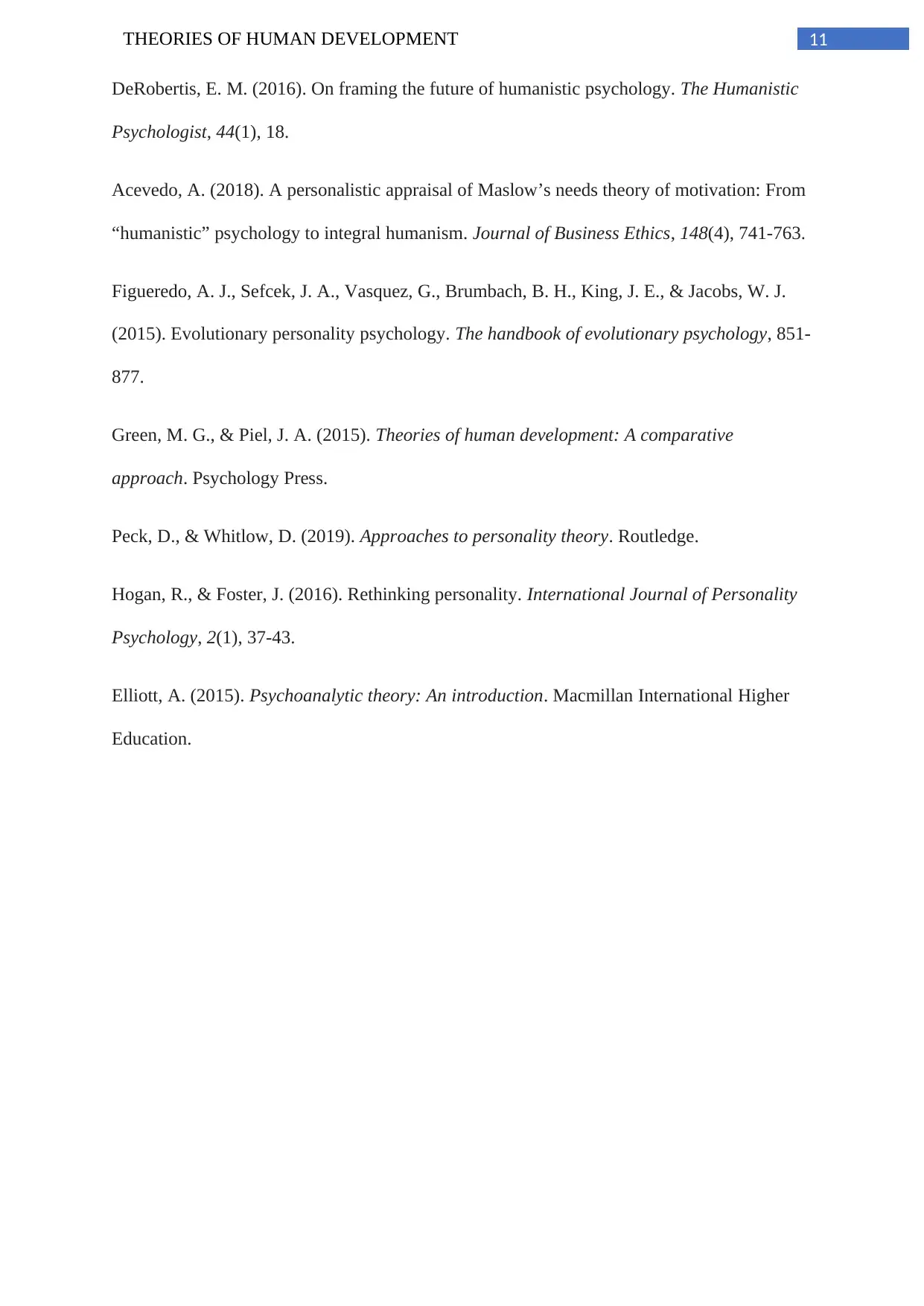
11THEORIES OF HUMAN DEVELOPMENT
DeRobertis, E. M. (2016). On framing the future of humanistic psychology. The Humanistic
Psychologist, 44(1), 18.
Acevedo, A. (2018). A personalistic appraisal of Maslow’s needs theory of motivation: From
“humanistic” psychology to integral humanism. Journal of Business Ethics, 148(4), 741-763.
Figueredo, A. J., Sefcek, J. A., Vasquez, G., Brumbach, B. H., King, J. E., & Jacobs, W. J.
(2015). Evolutionary personality psychology. The handbook of evolutionary psychology, 851-
877.
Green, M. G., & Piel, J. A. (2015). Theories of human development: A comparative
approach. Psychology Press.
Peck, D., & Whitlow, D. (2019). Approaches to personality theory. Routledge.
Hogan, R., & Foster, J. (2016). Rethinking personality. International Journal of Personality
Psychology, 2(1), 37-43.
Elliott, A. (2015). Psychoanalytic theory: An introduction. Macmillan International Higher
Education.
DeRobertis, E. M. (2016). On framing the future of humanistic psychology. The Humanistic
Psychologist, 44(1), 18.
Acevedo, A. (2018). A personalistic appraisal of Maslow’s needs theory of motivation: From
“humanistic” psychology to integral humanism. Journal of Business Ethics, 148(4), 741-763.
Figueredo, A. J., Sefcek, J. A., Vasquez, G., Brumbach, B. H., King, J. E., & Jacobs, W. J.
(2015). Evolutionary personality psychology. The handbook of evolutionary psychology, 851-
877.
Green, M. G., & Piel, J. A. (2015). Theories of human development: A comparative
approach. Psychology Press.
Peck, D., & Whitlow, D. (2019). Approaches to personality theory. Routledge.
Hogan, R., & Foster, J. (2016). Rethinking personality. International Journal of Personality
Psychology, 2(1), 37-43.
Elliott, A. (2015). Psychoanalytic theory: An introduction. Macmillan International Higher
Education.
1 out of 12
Related Documents
Your All-in-One AI-Powered Toolkit for Academic Success.
+13062052269
info@desklib.com
Available 24*7 on WhatsApp / Email
![[object Object]](/_next/static/media/star-bottom.7253800d.svg)
Unlock your academic potential
© 2024 | Zucol Services PVT LTD | All rights reserved.





